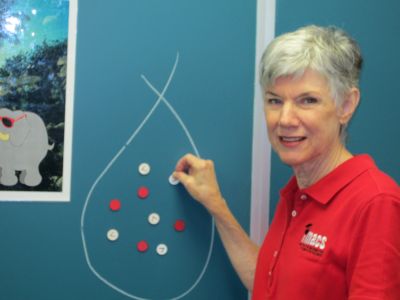
It’s winter at IMACS headquarters in South Florida. What does that mean? Sunshine. Temperature in the 70s and 80s. New Yorkers at the mall. Gotta love it! With the holidays around the corner, you might be wondering what to get for the math or science lover in your family. So we asked members of our IMACS family to share some of their favorite books or movies for our Winter 2011 Staff Picks list. Instructors Guy Barmoha, Frances Keiper and Jeff Piskun offered some terrific recommendations. If you’re still in need of ideas, check out more favorites from our Summer 2011 Staff Picks blog post.
Guy Barmoha, Senior IMACS Instructor
Guy has a BS in Mathematics from Florida State University and a Master of Science in Teaching Mathematics from Florida Atlantic University, where he continues to serve as a Teaching Assistant. He has been a part-time instructor with IMACS since 1995 and has taught all levels of our Mathematics Enrichment courses as well as the summer Logic Puzzles course, a Computer Enrichment course, and an Electronic course.
Guy is an award-winning teacher who taught middle school math for 11 years, including the Great Exploration in Mathematics gifted program. He received the prestigious Edyth May Sliffe Award for Excellence in Teaching in 1997. In 2001, he was a finalist for Broward County Teacher of the Year and was named Broward County Middle School Teacher of the Year in 2004. For the past four years, Guy has been a Mathematics Curriculum Specialist for Broward County Public Schools, and before that, he spent two years teaching math to distance-learning students. As you can tell, Guy is one busy, well, guy! But he always manages to find time to teach at IMACS. As he puts it, “Teaching here is always a bright spot in my week – the interactions with the students, parents, and staff always make it feel like home. Not to mention the great curriculum!”
Guy’s survey response is below:
“There are quite a few books that I enjoyed reading, not all related to mathematics. Even though we are mathematics educators, we all understand the importance of literacy. It is hard for me to pick a favorite book, so I will choose two to discuss. One that has some sentimental value, especially since we are discussing IMACS, is called What Is the Name of This Book? by Raymond Smullyan. This is more a compilation of logic puzzles than a novel; however, there are surely stories told within the book. You may ask why I chose this book. Well, the answer is simple – this is the book that reminds me of learning to teach at IMACS. In this book, students have to solve logic puzzles to find their way around the Island of Knights and Knaves, where Knights always tell the truth and Knaves always lie. Many of our logic puzzles that we use at IMACS are based on the problems in this book and other Raymond Smullyan books. I can still see our late founder, Burt Kaufman, teaching from this book and showing all the cases and subcases that students have to consider to solve the puzzles.
The second book is named Innumeracy by John Allen Paulos. Since we mentioned how important literacy is, we should not overlook the importance of numeracy. This book discusses consequences of innumeracy. A story from the book that sticks with me is the one about the stockbroker. The story goes something like this …
… Suppose I told you that I could predict the movement of the stock market correctly for the next five weeks in a row. Would you trust me enough to be one of my clients? Most people would. Well what you may not know is that I gave the same deal to 2,048 people. I then told half of them that the stock market will drop, and I told the other half that the stock market will rise. After the first week, there are 1,024 people who believe I predicted the movement of the market. Of those 1,024 people, I tell half that the market will drop and half that it will rise over the second week. By the end of this cycle, I will have 64 people who will believe that I am knowledgeable enough about the stock market to be able to predict its movement for five weeks in a row. …
This book was full of interesting situations like the one mentioned above. This is why I enjoyed reading it and refer to it often.”
Frances Keiper, IMACS Instructor
Frances has a BS in Mathematics from Stetson University and an MS in Applied Math from the University of Central Florida. She has been teaching part-time for IMACS since 2003 and previously taught math at Broward College. Frances worked for IBM Federal Systems Division at Cape Canaveral, Vandenberg AFB, and in Houston on Space Shuttle ground support software and on an upgrade to Mission Control flight information systems. She’s also had a few international assignments with IBM in Melbourne, Australia, where she created software and hardware upgrades for various banks, and in Kuala Lumpur, Malaysia, where she managed a project for the state-owned telephone company.
Frances’s survey response is below:
“I loved Dune by Frank Herbert – the book, not the movie. I got totally lost in the fantastic but somehow believable world Herbert created and just hated it when I finished the book. (I recommend skipping the sequel.) Herbert created a physical world full of sand containing creatures perfectly suited to that environment such as giant worms that travel rapidly over and through the sand. Then he populated the world with people who had their own elaborate social order and customs, again perfectly suited to that world but unlike anything we know on earth. The magic of the book is that it is so rich in detail and written so vividly that it becomes very real to the reader. You are drawn into this made-up universe. I don’t believe, even amidst the mountains of details regarding the physical and the social systems of Dune, that there is a single bit that is illogical. It all fits together so beautifully. You just have to believe.
For a more recent favorite, I really liked The Disappearing Spoon by Sam Kean. It’s full of quirky tales from the Periodic Table.
I loved the play Proof, which I saw at American Heritage Schools’ Mosaic Theater. And I liked the movie, too. It’s about a famous mathematician who is working incredibly hard to develop a proof, something that will be acclaimed the world over. He is an old man in the story and dies. His daughter, a mathematician in her own right, cares for him and grieves at his death. At first you’re not sure if the old mathematician was a genius or crazy. His behavior was bizarre. After a while, you’re convinced he was crazy.
Then a young math student shows up and trolls through the old man’s notebooks looking to find or maybe steal his brilliant but maybe non-existent proof. The twist toward the end is that the student finds the brilliant proof, but the person who developed it is the old mathematician’s daughter! I especially loved the fact that the hero is a FEMALE mathematician!
I almost never miss checking in to see what topics NPR’s Science Friday covered during it’s most recent broadcast. And I also really like an Australian call-in science show from Triple J Youth Radio. It’s called Dr. Karl. Dr. Karl himself is an enthusiastic and engaging science guy who can explain anything in simple terms and will readily admit that he’s not qualified to answer when he isn’t!”
Jeff Piskun, Senior IMACS Instructor
Jeff has a BS in Mathematics from Villanova University and an MS in Sports Administration from St. Thomas University. He started with IMACS in 2003 and is currently one of our part-time instructors. Jeff also teaches middle school math. A big sports enthusiast, he worked for over six years in sports and entertainment venue management for several professional teams, including the Florida Marlins, Miami Heat, and Florida Panthers.
Jeff’s survey response is below:
“Two books I would recommend are Freakonomics and Super Freakonomics by Steven Levitt and Stephen Dubner. These two economists use basic economic principals and basic statistics to look at real-life situations and investigate the hidden side of everything. The books are written in a fun but eye-opening manner and explain things like: why charging parents late pickup fees will actually increase late pickups not deter them; why your realtor actually does not have your best interest at heart; how walking drunk is more dangerous than driving drunk (not endorsed!); that many government programs actually have the opposite effect than intended (shocker). Parents should note that the books address some adult topics, so beware, but they are really an eye-opening read.
I enjoy movies that are similar to the original Stargate with Kurt Russell and James Spader. I like anything with codes and ancient secrets and the science/adventure/historical fiction genre overall. I’m intrigued by the idea that even though certain events are part of “history,” we still do not know everything about what occurred and why. Many many years later there are still mysteries and puzzles that need to be solved and theories to be investigated. Codes, puzzles, and mysteries based on historical events and real data are exponentially more fascinating than fictional ones.”
Guy, Frances and Jeff – Thank you for the awesome recommendations!
To our readers – Thank you for making our blog a part of your online experience. We sincerely appreciate your time, comments and feedback. Our next post on December 22nd will be a classic from the IMACS vault. All the best to you and your families for a wonderful holiday season and happy and healthy New Year!











Leave a Reply